Unit 1 Looking forwards Using language 课件(共52张,内嵌音频)2024-2025学年高二英语外研版(2019)选择性必修4
文档属性
| 名称 | Unit 1 Looking forwards Using language 课件(共52张,内嵌音频)2024-2025学年高二英语外研版(2019)选择性必修4 | 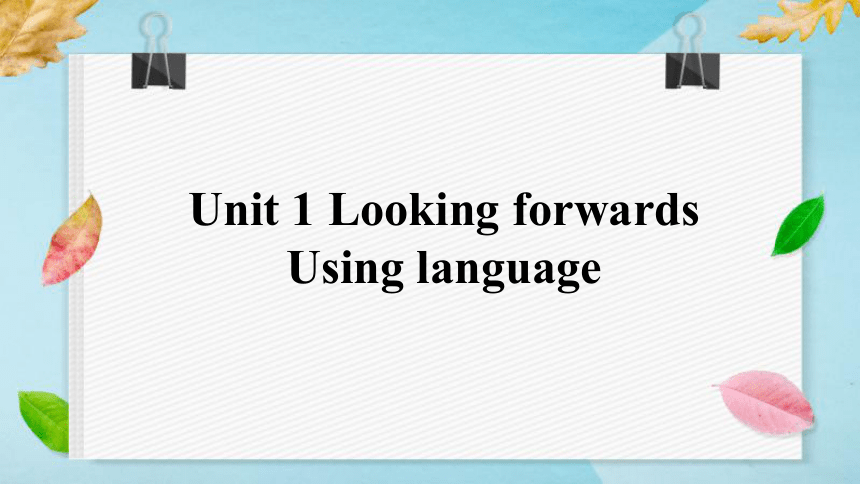 | |
| 格式 | pptx | ||
| 文件大小 | 8.5MB | ||
| 资源类型 | 教案 | ||
| 版本资源 | 外研版(2019) | ||
| 科目 | 英语 | ||
| 更新时间 | 2025-04-23 16:17:55 | ||
图片预览


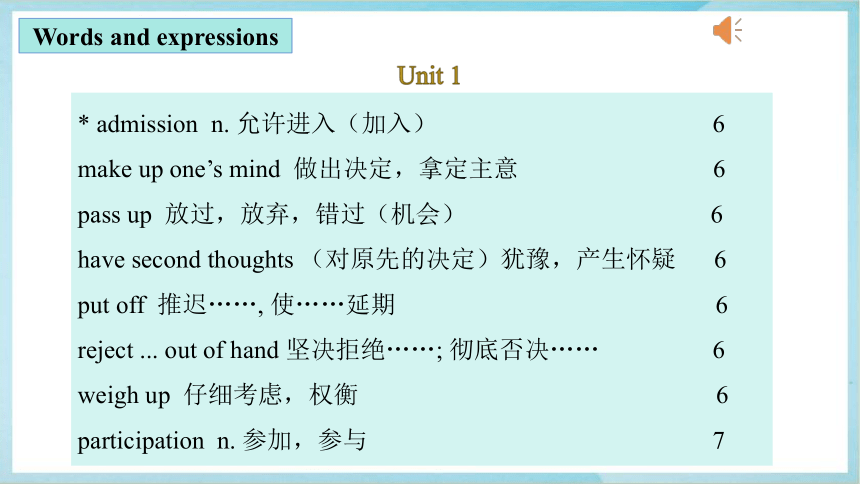
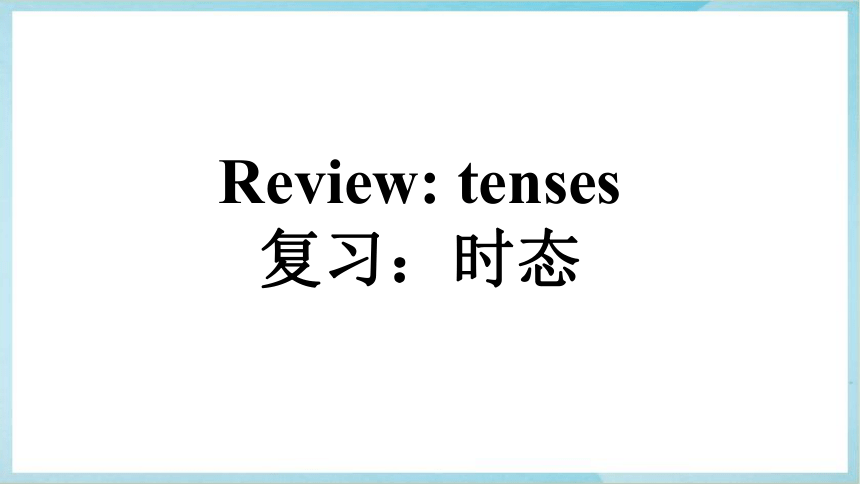
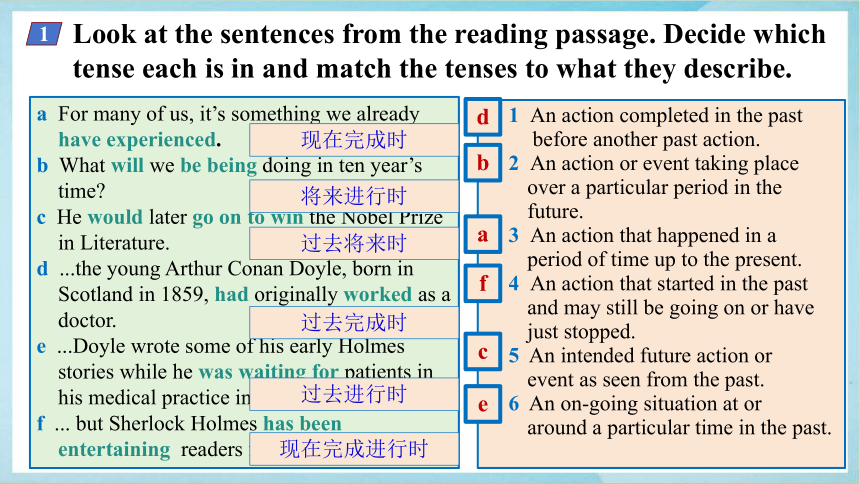

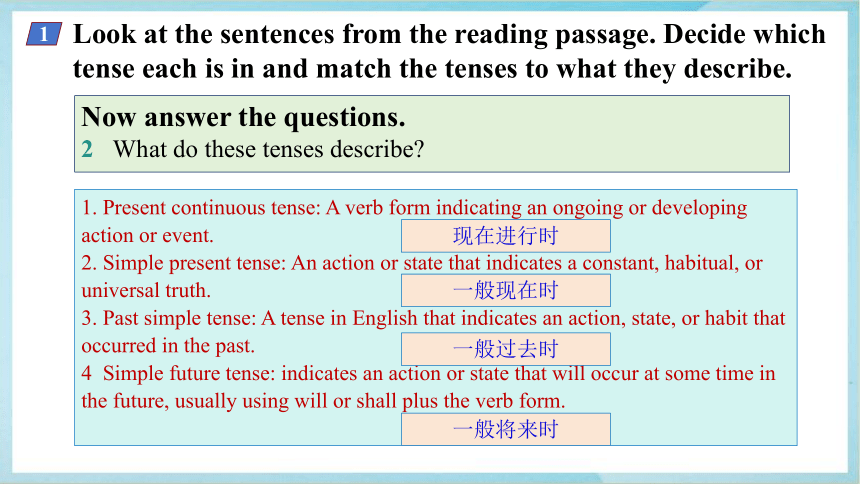
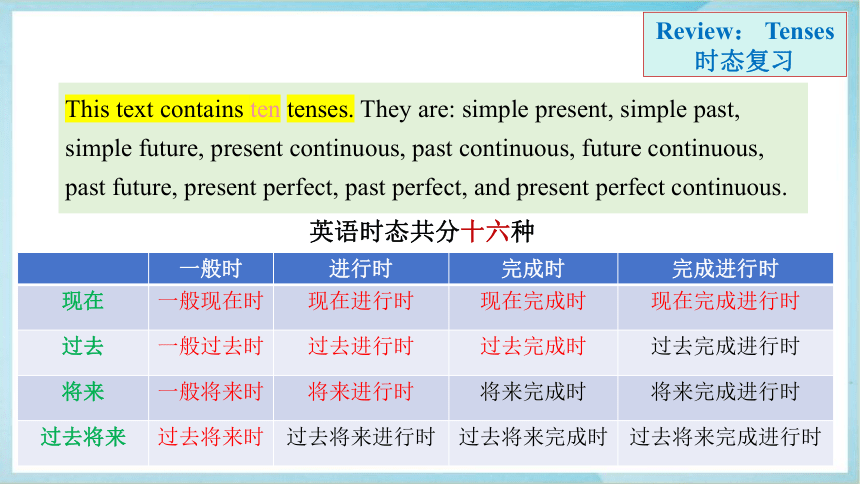
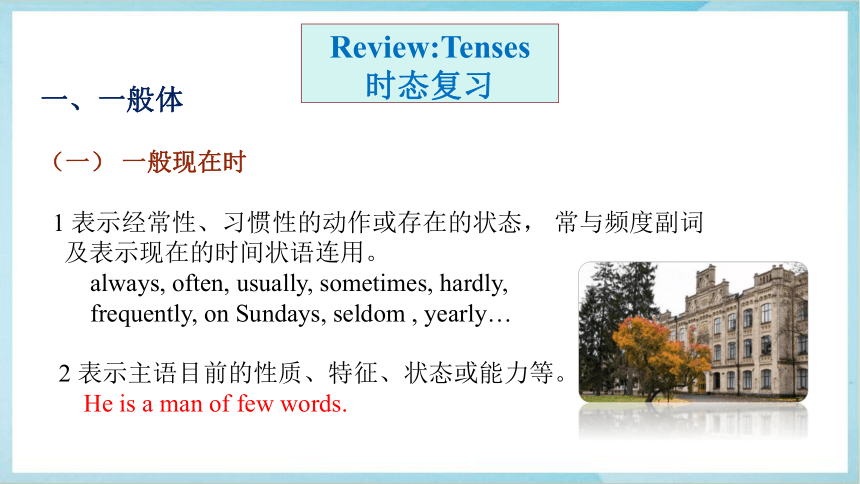
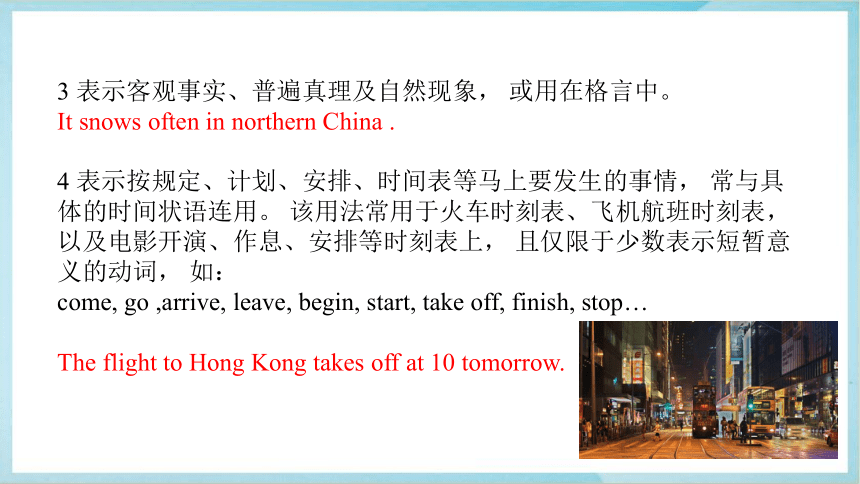
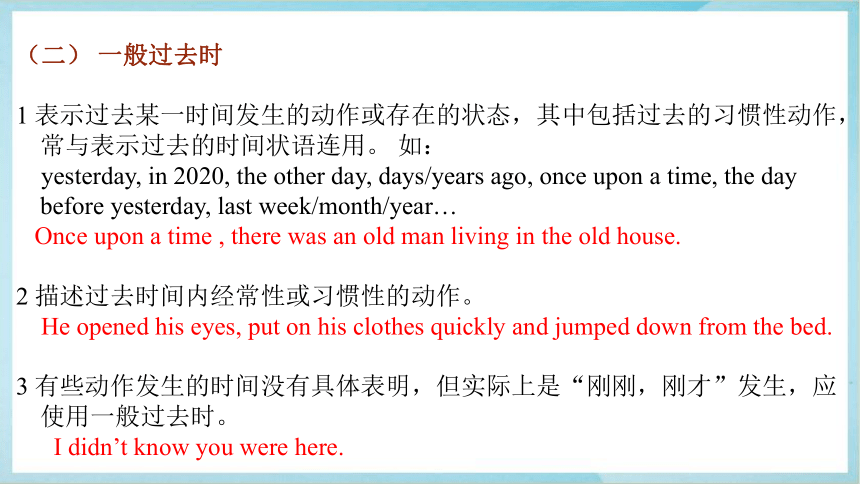

文档简介
(共52张PPT)
Unit 1 Looking forwards
Using language
To review, consolidate and flexibly use the common tenses of verbs in the actual context.
To learn and master the expression of "Choices and decisions", and be able to use it flexibly in real life.
To learn how to politely ask questions and explain reasons, and be able to learn relevant expressions in real life.
Learning objectives
Unit 1
* admission n. 允许进入(加入) 6
make up one’s mind 做出决定,拿定主意 6
pass up 放过,放弃,错过(机会) 6
have second thoughts (对原先的决定)犹豫,产生怀疑 6
put off 推迟……, 使……延期 6
reject ... out of hand 坚决拒绝……; 彻底否决…… 6
weigh up 仔细考虑,权衡 6
participation n. 参加,参与 7
Words and expressions
Review: tenses
复习:时态
Look at the sentences from the reading passage. Decide which tense each is in and match the tenses to what they describe.
1
a For many of us, it’s something we already
have experienced.
b What will we be being doing in ten year’s
time
c He would later go on to win the Nobel Prize
in Literature.
d ...the young Arthur Conan Doyle, born in
Scotland in 1859, had originally worked as a
doctor.
e ...Doyle wrote some of his early Holmes
stories while he was waiting for patients in
his medical practice in London.
f ... but Sherlock Holmes has been
entertaining readers for well over a century.
1 An action completed in the past
before another past action.
2 An action or event taking place
over a particular period in the
future.
3 An action that happened in a
period of time up to the present.
4 An action that started in the past
and may still be going on or have
just stopped.
5 An intended future action or
event as seen from the past.
6 An on-going situation at or
around a particular time in the past.
a
b
c
d
e
f
现在完成时
将来进行时
过去将来时
过去完成时
过去进行时
现在完成进行时
1. One moment, we are lying comfortably in ... a deep sleep.
2. The next, our eyes are open and we find ourselves ... our lives --- the future.
3. Although they shared the same ambitious ..., their careers unfolded in contrasting ways.
4 So you have to trust that the dots will somehow connect in your future.
现在进行时
一般现在时
一般过去时
一般将来时
Now answer the questions.
1 What other tenses have you learnt
Find examples in the reading passage.
Look at the sentences from the reading passage. Decide which tense each is in and match the tenses to what they describe.
1
1. Present continuous tense: A verb form indicating an ongoing or developing action or event.
2. Simple present tense: An action or state that indicates a constant, habitual, or universal truth.
3. Past simple tense: A tense in English that indicates an action, state, or habit that occurred in the past.
4 Simple future tense: indicates an action or state that will occur at some time in the future, usually using will or shall plus the verb form.
现在进行时
一般现在时
一般过去时
一般将来时
Now answer the questions.
2 What do these tenses describe
Look at the sentences from the reading passage. Decide which tense each is in and match the tenses to what they describe.
1
This text contains ten tenses. They are: simple present, simple past, simple future, present continuous, past continuous, future continuous, past future, present perfect, past perfect, and present perfect continuous.
一般时 进行时 完成时 完成进行时
现在 一般现在时 现在进行时 现在完成时 现在完成进行时
过去 一般过去时 过去进行时 过去完成时 过去完成进行时
将来 一般将来时 将来进行时 将来完成时 将来完成进行时
过去将来 过去将来时 过去将来进行时 过去将来完成时 过去将来完成进行时
Review: Tenses
时态复习
英语时态共分十六种
一、一般体
(一) 一般现在时
1 表示经常性、习惯性的动作或存在的状态, 常与频度副词及表示现在的时间状语连用。
always, often, usually, sometimes, hardly,
frequently, on Sundays, seldom , yearly…
2 表示主语目前的性质、特征、状态或能力等。
He is a man of few words.
Review:Tenses
时态复习
3 表示客观事实、普遍真理及自然现象, 或用在格言中。
It snows often in northern China .
4 表示按规定、计划、安排、时间表等马上要发生的事情, 常与具体的时间状语连用。 该用法常用于火车时刻表、飞机航班时刻表,以及电影开演、作息、安排等时刻表上, 且仅限于少数表示短暂意义的动词, 如:
come, go ,arrive, leave, begin, start, take off, finish, stop…
The flight to Hong Kong takes off at 10 tomorrow.
(二) 一般过去时
1 表示过去某一时间发生的动作或存在的状态,其中包括过去的习惯性动作,常与表示过去的时间状语连用。 如:
yesterday, in 2020, the other day, days/years ago, once upon a time, the day before yesterday, last week/month/year…
Once upon a time , there was an old man living in the old house.
2 描述过去时间内经常性或习惯性的动作。
He opened his eyes, put on his clothes quickly and jumped down from the bed.
3 有些动作发生的时间没有具体表明,但实际上是“刚刚,刚才”发生,应使用一般过去时。
I didn’t know you were here.
(三) 一般将来时
1 will/shall +动词原型
1)表示将要发生的动作或将来存在的状态, shall 一般用于第一人称, will可用于各种人称, 常与表示将来的时间状语连用。
tomorrow, in the future, later on , before long, next week/month/year, the day after tomorrow.
2) Will 还可表示说话时临时作出的决定。
---Dr Jackson is not in his office at the moment.
---All right. I will call him later.
2 be going to + 动词原形
表示按计划、打算将要做某事件;还可以表示“预见”,
即根据某种迹象预示着要发生某事。
Look at the dark clouds. It is going to rain.
3 be about to do +动词原形/be on the point of doing
这两种结构不与表示将来的具体时间状语连用,但可以和并列连词when引出的分句连用。
The train is about to start.
4 be to do
They are to meet at the gate of the school.(表按计划)
You are to report it to the police.( 按职责,规定,命令等应该做某事)
Your plan is to be a failure.(表示注定要发生的事情)
(四)过去将来时
过去将来时表示从过去某一时间看将要发生的动作或存在的状态。
should/would +do
was/were (going /about) to do
He said he would be here at nine o`clock.
二、进行体
(一) 现在进行时
1 表示现在(说话人说话时)正在发生或进行的动作、状态、或现阶段一直进行着的动作,常与一些标志性的时间状语连用。
am/is/are doing
now, right now, at present, these days, at this moment
2 一些非延续性动词可用现在进行时表示按计划、安排将要发生的动作,常见的这类动词有:
come, go, leave, arrive, start, begin, return, move, take…
(二) 过去进行时
1 表示过去某一时刻正在发生的动作,或过去某一个阶段内一直在进行的动作。 Was/were doing
常用的时间状语有:
at this/that time (yesterday/the day before yesterday) ,
at …o`clock , from…to …, those days, just now
现在进行时及过去进行时常与always, constantly, continually, all the time等连用,表示反复出现的或习惯性动作,或强调赞赏,生气,厌恶,好奇等感彩,不强调动作正在进行。
He is always helping others.
She is forgetting something all the time.
2 表示动作在另一个过去的动作发生时正在进行,常与when, while引导的时间状语从句连用。
My brother fell while he was riding his bicycle yesterday .
3 一些非延续性动词可用在过去进行时表示过去按计划,安排将要发生的动作,多用于从句中。常见的该类动词有:
go ,come, leave, start, arrive, return, work, move…
He said he was starting the next day.
(三) 将来进行时
表示将来某一时刻或某一段时间里正在进行的动作,常与一些标志性的时间状语连用。 其构成是 : will be doing
at this time tomorrow/the day after tomorrow
by then, from 1:30 to 4:30 tomorrow
Robert will be cooking dinner at this time tomorrow.
(四)现在完成进行时 have/has been doing
1 表示过去的动作持续到现在并有可能延续下去,常和for, since引导的时间状语连用。
Tom looks tired because he has been cleaning the house since 9 am.
2 表示重复性动作。
You have been saying you can succeed for five years.
3 表示某种感彩。
Too much has been happening today.
三、完成体
(一) 现在完成时
1 表示过去发生且已经完成的某一动作对现在造成的影响或结果。
have/has done 常用的时间状语: already, just, yet, before…
I have already seen the film.
2 表示从过去某一时间开始一直持续到现在,也许还将持续下去的动作或状态。常用的时间状语: lately, recently, in the last/past few days/years, since then, up to now, so far…
In the past few years, many new railways have been laid down.
3 在“最高级+名词”或“It /That is /will be the first (second)…time”之后的定语从句中,谓语动词用现在完成时。
This is the first time (that) I have come here.
4 瞬间动词又叫非延续性动词。瞬间动词可以用于完成时态, 但不可以接表示一段时间的状语;若要接表示一段时间的状语,需要一些转换。
He has come to Beijing since last year. ×
He has lived in Beijing since last year. √
buy—have borrow---keep get married--- be married
get to know---know leave---away come back---be back
fall ill---be ill die---be dead turn off---be off
begin---be go to bed---sleep join ---be a member of …
(二)过去完成时
1过去完成时,表示过去的过去。 had+done
He said that he had been abroad for 3 years.
2 表示过去某一时间的动作或状态持续到过去的另一时间,还可能持续下去,常用的时间状语有:by/until/before/by the end of +过去的某一时间”.
By then he had learned English for 3 years.
3 表示愿望,打算的词。如:hope, expect, mean, intend want, suppose等,其过去完成时表示过去未曾实现的愿望或意图。
I had hoped to see more of Shanghai.
4 用于某些固定句型中:
(1)Hardly/Scarcely/Rarely…when…, No sooner…than…, when 和than 从句里用一般过去时,主句用过去完成时,且用倒装,表示“刚刚…就…”.
Hardly/No sooner had I got home when/than the rain poured down.
(2) It was /had been +一段时间+since从句。
Since 从句的为证用过去完成时。
It was ten years since we had had such a wonderful time.
(3) That/ It /This was the first/second…time+ that从句。
That从句的谓语要用过去完成时。
It was the third time (that) he had left the key at home.
(三)将来完成时
将来完成时表示到将来某一时间, 某一动作将会完成。
will have done. 常用的时间状语为“ by+将来的某个时间”
By this time of next year, all of you will have become college students.
1 China`s high-speed railways _______________(grow) from 9000 to 25000 km in the past few years.
2 ---Hi, I am Peter. Are you new here I haven’t seen you around.
--- Hello, Peter. I am Bob. I just ________(start) on Monday.
3 I _____________(drive) down to London when I suddenly found that I was on the wrong road.
4 People _________(have) better access to health care than they used to, and they`re living longer as a result.
have grown
started
was driving
have
practice
5 Silk ______________(become)one of the primary goods traded along the Silk Road by about 100 BC.
6 Dashan, who _____________________(learn) crosstalk, the Chinese comedic tradition for decades, wants to mix it up with the Western
stand-up tradition.
7 As you go through this book, you ____________(find) that each of the millions of people who lived through World War Ⅱ had a different experience.
8 They made up their minds that they ______________(buy) a new house once Larry changed jobs.
had become
has been learning
will find
would buy
Foundation. It is wonderful to meet such friendly local people who are happy to share their lives with us.
I 5 __________ (feel) happy and free of worries. And, of course, I 6 __________ (become) fitter. This gap year has been a fantastic opportunity for my personal growth, and I surely 7 _____________ (continue) to learn about how other people live their lives after it ends.
Complete the blog with the correct form of the verbs in brackets.
I woke at dawn again and already the birds 1 ____________ (sing). In the coming days, we 2 ____________ (pain) the toilet block that we had been building over the last two months.
I 3____________ (live) in this Cambodian village for two months. Despite the hard physical work, I 4 ____________ (not regret) for one moment choosing to spend my gap year as a volunteer for the Cambodia
2
我又在黎明时分醒来,鸟儿已经在歌唱了。 在接下来的几天里,我们将粉刷我们在过去两个月里建造的厕所。
我在这个柬埔寨村庄住了两个月了。 尽管体力劳动繁重,但我不后悔有那么一瞬间,我选择用我的空档年为柬埔寨基金会做志愿者。 很高兴能遇到这么友好的当地人,他们很高兴和我们分享他们的生活。
我感到快乐和无忧无虑。 当然,我正在变得健康。 这个间隔年对我个人的成长来说是一个极好的机会,在结束志愿者活动后,我肯定会继续了解别人是如何生活的。
Complete the blog with the correct form of the verbs in brackets.
2
Foundation. It is wonderful to meet such friendly local people who are happy to share their lives with us.
I 5 __________ (feel) happy and free of worries. And, of course, I 6 ___________ (become) fitter. This gap year has been a fantastic opportunity for my personal growth, and I surely 7 _____________ (continue) to learn about how other people live their lives after it ends.
Complete the blog with the correct form of the verbs in brackets.
I woke at dawn again and already the birds 1 ____________ (sing). In the coming days, we 2 _______________ (pain) the toilet block that we had been building over the last two months.
I 3______________ (live) in this Cambodian village for two months. Despite the hard physical work, I 4 ____________ (not regret) for one moment choosing to spend my gap year as a volunteer for the Cambodia
2
were singing
would be painting
have been living
don’t regret
feel
am becoming
will continue
Work in pairs. Read the profile and talk about David’s life
Using different tenses where appropriate.
PERSONAL INFORATION
Date of Birth 20 June 2001
Nationality British
EDUCATION
2007-2013 Carson Primary School
2013-2019 Wildwood High School
EXTRACURRICULAR EXPERIENCE
Sept 2017 first prize for school science project
Apr-Oct 2018 exchange programme in China
Jul 2019-present gap year in Cambodia
FUTURE PLANS
undergraduate study at Newcastle University
chemical engineer after graduation
voluntary work to help people in need
David Mason
3
4
Work in pairs. Interview each other about your past experience and future plans. Share them with the class using different tenses where appropriate.
Share Your Stories!
Choices and decisions
选择和决定
Read the conversation and answer the questions. Pay attention to the expressions in bold.
Jenny: What’s up, Li Ling You look worried.
Li Ling: I’m facing a difficult decision. I’ve been
recommended for admission to study
physics at my dream university.
Jenny: Congratulations! But what do you mean by
a difficult decision I think the course is
tailor-made for you!
Li Ling: Well, it sounds wonderful, but I had already decided to take the college
entrance exam and apply to the Medical School there. I can’t make up my
mind what the right thing to do is.
Jenny: I think it would be a great pity to pass up the opportunity to be admitted
without taking the exam.
Li Ling: I know, but I have always wanted to study medicine and become a dentist.
Physics is interesting, but it’s not my preferred major.
5
Read the conversation and answer the questions. Pay attention to the expressions in bold.
珍妮:怎么了,李玲 你看起来忧心忡忡。
李玲:我正面临一个艰难的决定。 我已经被推荐进入我
梦想的大学去学习物理学。
珍妮:恭喜你! 但你说的困难的决定是什么意思呢 我认
为这门课为你量身打造的!
李玲:嗯,听起来不错,但我已经决定参加高考并申请
那里的医学院了。 我无法决定做什么才是正确的。
珍妮:我想如果错过了不参加考试就被录取的机会是非常遗憾的。
李玲:我知道,但是我一直想学医,成为一名医生。物理学很有趣,但
不是我喜欢的专业。
5
Read the conversation and answer the questions. Pay attention
to the expressions in bold.
Jenny: Then why the indecision Go for your
preferred major.
Li Ling: But what if I don’t do well enough in the
exam to get into the Medical School I’m
really having second thoughts.
Jenny: Can you put off making a decision until you’ve
spoken to your high school advisor
Li Ling: I have already talked to her. She told me
that I must decide what’s right for me now, and then go for it. The
problem is I don’t know what is right for me.
Jenny: Well, I wouldn’t reject anything out of hand. Let’s go for lunch.
Then we can weigh up the options and try to come to a decision.
Let’s put the kettle on.
5
Read the conversation and answer the questions. Pay attention to the expressions in bold.
珍妮:那为什么还犹豫不决呢 选择更喜欢的专业吧。
李玲:但是如果我考试考得不够好,进不了医学院怎么
办 我真的是犹豫不决。
珍妮:你能不能把做决定的时间推迟到你跟你的高中指
导老师谈过之后吗
李玲:我已经和她谈过了。 她告诉我,我现在必须决定
什么是适合我的,然后去做它。问题是我不知道什么是适合我的。
珍妮:嗯,我不会彻底拒绝任何东西。 我们去吃午饭吧。 然后我们可
以权衡一下选择,尽量作出决定。 我们把水壶烧上吧。
5
5
Read the conversation and answer the questions. Pay attention to the expressions in bold.
1 What difficult decision is Li Ling facing Why is she feeling worried
2 What does Jenny suggest to her
She has to make a choice between studying physics at her dream university, as she has been admitted without taking any exam, and taking the college entrance exam and applying to the Medical School. She can’t make up her mind what the right thing to do is.
Jenny at first suggested to Li Ling that she should go for her preferred major. Then she suggested that she could put off making a decision until she has spoken to her high school advisor. Since Li Ling still could not make a decision, Jenny suggested that they go for lunch and then weigh up the options.
5
Read the conversation and answer the questions. Pay attention to the expressions in bold.
3 What would you do when faced with a difficult decision
When faced with a difficult decision like this, I would first assess my true passions and long-term goals. If medicine is my heartfelt interest and I am willing to work hard for it, I would choose to prepare for the college entrance examination to pursue medical studies. However, if I find physics equally appealing or consider it a viable career option, I might consider accepting the early admission. Ultimately, the decision should reflect my personal aspirations and willingness to take on the associated challenges.
1 May is ____________________________________.
2 Jane is ____________________________________.
3 Paul finds it easy ____________________________.
4 Bill is _____________________________________.
5 Amanda wants to ____________________________.
6 Jia Ying has decided to _____________________.
having second thoughts
putting off making a decision
to make up his mind
rejecting something out of hand
weigh up the options
pass up the opportunity
6
Read the statements and complete the sentences with correct form of expressions in Activity 5.
1 What can students achieve via part-time jobs
2. What regulations are in place for students doing part-time jobs in the UK
3. Have you ever had a part-time job Why did you do it
7
Read the passage and answer the questions.
青少年成长为成熟和负责任的社会成员是至关重要的。除了参加学校学习,兼职工作也会对这个过渡有帮助。它可以帮助他们取得新的成就,了解社会,变得更加独立。
许多国家现在都有法律来规范学生的兼职工作。例如,在英国,法律规定,15岁和16岁的学生在学期期间每周最多可以工作12小时,在学校假期每周最多可以工作35小时。他们不允许在早上7点之前或晚上7点之后工作。
It is crucial for teenagers to develop into mature and responsible members of society. In addition to participation in school, a part-time job can also be helpful in this transition. It can help them achieve new accomplishments, learn about society and become more independent.
Many countries now have laws to regulate part-time employment for students. In the UK, for example, the law states that students aged15 and 16 are allowed to work a maximum of 12 hours per week during term time, and 35 hours per week during school holidays. They are not allowed to work before 7 am or after7 pm.
7
Read the passage and answer the questions.
1 What can students achieve via part-time jobs
Students can achieve new accomplishments, learn about society and become more independent via part-time jobs. / Students can develop into mature and responsible members of society via part-time jobs.
It is crucial for teenagers to develop into mature and responsible members of society. In addition to participation in school, a part-time job can also be helpful in this transition. It can help them achieve new accomplishments, learn about society and become more independent.
Many countries now have laws to regulate part-time employment for students. In the UK, for example, the law states that students aged15 and 16 are allowed to work a maximum of 12 hours per week during term time, and 35 hours per week during school holidays. They are not allowed to work before 7 am or after 7 pm.
7
Read the passage and answer the questions.
2. What regulations are in place for students doing part-time jobs in the UK
In the UK, the law states that students aged 15 and 16 are allowed to work a maximum of 12 hours per week during term time, and 35 hours per week during school holidays. They are not allowed to work before 7 am or after 7 pm.
It is crucial for teenagers to develop into mature and responsible members of society. In addition to participation in school, a part-time job can also be helpful in this transition. It can help them achieve new accomplishments, learn about society and become more independent.
Many countries now have laws to regulate part-time employment for students. In the UK, for example, the law states that students aged15 and 16 are allowed to work a maximum of 12 hours per week during term time, and 35 hours per week during school holidays. They are not allowed to work before 7 am or after 7 pm.
7
Read the passage and answer the questions.
3. Have you ever had a part-time job Why did you do it
Yes, I have had a part-time job before. I took it mainly for several reasons: to gain practical experience, learn more about society, and most importantly, to become more independent financially. It helped me develop important skills and a better understanding of life beyond academics.
7
Read the passage and answer the questions.
It is crucial for teenagers to develop into mature and responsible members of society. In addition to participation in school, a part-time job can also be helpful in this transition. It can help them achieve new accomplishments, learn about society and become more independent.
Many countries now have laws to regulate part-time employment for students. In the UK, for example, the law states that students aged15 and 16 are allowed to work a maximum of 12 hours per week during term time, and 35 hours per week during school holidays. They are not allowed to work before 7 am or after 7 pm.
8
Listen to the interview and choose the job Richard applied for.
Why did Richard apply for this job
Because he has always been interested in 1_________________.
What did Richard do in his previous holiday
He worked in a youth hostel in Vietnam,
2 _________________________
3 He worked _______________________ in Bali.
He 4 _____________________________ in Thailand.
dealing with people
guiding visitors to local sites
as a lifeguard on the beach
worked selling food at a street stall
9
Listen again and complete the notes.
Why does Richard believe he is suitable for the job
Because he is a 5__________ and outgoing person,
and feels happy when 6______________________________.
Why did Richard do part-time job
His 7________________ have made him a flexible individual.
Because he 9 __________________________ his holiday times.
Because the experiences would 10 _________________________________________.
8 _________________________ is relevant.
friendly
he is working hard to satisfy people
travel experiences
His previous work experience
desires to make the best use of
prepare him for his future college application
9
Listen again and complete the notes.
Would you mind … May I ask why …
The reason is … It’s because…
Could you tell me… I’d say it’s due to…
…, if you wouldn’t Would you explain…
mind It’s a result of…
Asking polite questions Giving reasons
10
Complete the boxes with the expressions from the interview.
Asking polite questions Giving reasons
礼貌地问问题 给出原因
Would you mind …
May I ask why…
Could you tell me…
Would you explain…
if you wouldn’t mind.
The reason is…
It’s because…
I’d say it’s due to…
It’s a result of…
10
Complete the boxes with the expressions from the interview.
11
Now consider if you could effectively participate in a job interview.
Work in pairs. Choose a part-time job advertisement in Activity 8 and act out an interview using the expressions in this section.
Show Time
Please write an English essay in 150 words or less about your opinion when you are faced with a dilemma.
Homework
When faced with a dilemma, I first try to stay calm. I think about the good and bad sides of each choice.
I also ask friends or family for their opinions because they might see things I can't. This helps me see the situation more clearly.
In the end, I trust my own judgment and choose what feels right. Even if the outcome isn't perfect, I learn from it and move on.
Sample
Unit 1 Looking forwards
Using language
To review, consolidate and flexibly use the common tenses of verbs in the actual context.
To learn and master the expression of "Choices and decisions", and be able to use it flexibly in real life.
To learn how to politely ask questions and explain reasons, and be able to learn relevant expressions in real life.
Learning objectives
Unit 1
* admission n. 允许进入(加入) 6
make up one’s mind 做出决定,拿定主意 6
pass up 放过,放弃,错过(机会) 6
have second thoughts (对原先的决定)犹豫,产生怀疑 6
put off 推迟……, 使……延期 6
reject ... out of hand 坚决拒绝……; 彻底否决…… 6
weigh up 仔细考虑,权衡 6
participation n. 参加,参与 7
Words and expressions
Review: tenses
复习:时态
Look at the sentences from the reading passage. Decide which tense each is in and match the tenses to what they describe.
1
a For many of us, it’s something we already
have experienced.
b What will we be being doing in ten year’s
time
c He would later go on to win the Nobel Prize
in Literature.
d ...the young Arthur Conan Doyle, born in
Scotland in 1859, had originally worked as a
doctor.
e ...Doyle wrote some of his early Holmes
stories while he was waiting for patients in
his medical practice in London.
f ... but Sherlock Holmes has been
entertaining readers for well over a century.
1 An action completed in the past
before another past action.
2 An action or event taking place
over a particular period in the
future.
3 An action that happened in a
period of time up to the present.
4 An action that started in the past
and may still be going on or have
just stopped.
5 An intended future action or
event as seen from the past.
6 An on-going situation at or
around a particular time in the past.
a
b
c
d
e
f
现在完成时
将来进行时
过去将来时
过去完成时
过去进行时
现在完成进行时
1. One moment, we are lying comfortably in ... a deep sleep.
2. The next, our eyes are open and we find ourselves ... our lives --- the future.
3. Although they shared the same ambitious ..., their careers unfolded in contrasting ways.
4 So you have to trust that the dots will somehow connect in your future.
现在进行时
一般现在时
一般过去时
一般将来时
Now answer the questions.
1 What other tenses have you learnt
Find examples in the reading passage.
Look at the sentences from the reading passage. Decide which tense each is in and match the tenses to what they describe.
1
1. Present continuous tense: A verb form indicating an ongoing or developing action or event.
2. Simple present tense: An action or state that indicates a constant, habitual, or universal truth.
3. Past simple tense: A tense in English that indicates an action, state, or habit that occurred in the past.
4 Simple future tense: indicates an action or state that will occur at some time in the future, usually using will or shall plus the verb form.
现在进行时
一般现在时
一般过去时
一般将来时
Now answer the questions.
2 What do these tenses describe
Look at the sentences from the reading passage. Decide which tense each is in and match the tenses to what they describe.
1
This text contains ten tenses. They are: simple present, simple past, simple future, present continuous, past continuous, future continuous, past future, present perfect, past perfect, and present perfect continuous.
一般时 进行时 完成时 完成进行时
现在 一般现在时 现在进行时 现在完成时 现在完成进行时
过去 一般过去时 过去进行时 过去完成时 过去完成进行时
将来 一般将来时 将来进行时 将来完成时 将来完成进行时
过去将来 过去将来时 过去将来进行时 过去将来完成时 过去将来完成进行时
Review: Tenses
时态复习
英语时态共分十六种
一、一般体
(一) 一般现在时
1 表示经常性、习惯性的动作或存在的状态, 常与频度副词及表示现在的时间状语连用。
always, often, usually, sometimes, hardly,
frequently, on Sundays, seldom , yearly…
2 表示主语目前的性质、特征、状态或能力等。
He is a man of few words.
Review:Tenses
时态复习
3 表示客观事实、普遍真理及自然现象, 或用在格言中。
It snows often in northern China .
4 表示按规定、计划、安排、时间表等马上要发生的事情, 常与具体的时间状语连用。 该用法常用于火车时刻表、飞机航班时刻表,以及电影开演、作息、安排等时刻表上, 且仅限于少数表示短暂意义的动词, 如:
come, go ,arrive, leave, begin, start, take off, finish, stop…
The flight to Hong Kong takes off at 10 tomorrow.
(二) 一般过去时
1 表示过去某一时间发生的动作或存在的状态,其中包括过去的习惯性动作,常与表示过去的时间状语连用。 如:
yesterday, in 2020, the other day, days/years ago, once upon a time, the day before yesterday, last week/month/year…
Once upon a time , there was an old man living in the old house.
2 描述过去时间内经常性或习惯性的动作。
He opened his eyes, put on his clothes quickly and jumped down from the bed.
3 有些动作发生的时间没有具体表明,但实际上是“刚刚,刚才”发生,应使用一般过去时。
I didn’t know you were here.
(三) 一般将来时
1 will/shall +动词原型
1)表示将要发生的动作或将来存在的状态, shall 一般用于第一人称, will可用于各种人称, 常与表示将来的时间状语连用。
tomorrow, in the future, later on , before long, next week/month/year, the day after tomorrow.
2) Will 还可表示说话时临时作出的决定。
---Dr Jackson is not in his office at the moment.
---All right. I will call him later.
2 be going to + 动词原形
表示按计划、打算将要做某事件;还可以表示“预见”,
即根据某种迹象预示着要发生某事。
Look at the dark clouds. It is going to rain.
3 be about to do +动词原形/be on the point of doing
这两种结构不与表示将来的具体时间状语连用,但可以和并列连词when引出的分句连用。
The train is about to start.
4 be to do
They are to meet at the gate of the school.(表按计划)
You are to report it to the police.( 按职责,规定,命令等应该做某事)
Your plan is to be a failure.(表示注定要发生的事情)
(四)过去将来时
过去将来时表示从过去某一时间看将要发生的动作或存在的状态。
should/would +do
was/were (going /about) to do
He said he would be here at nine o`clock.
二、进行体
(一) 现在进行时
1 表示现在(说话人说话时)正在发生或进行的动作、状态、或现阶段一直进行着的动作,常与一些标志性的时间状语连用。
am/is/are doing
now, right now, at present, these days, at this moment
2 一些非延续性动词可用现在进行时表示按计划、安排将要发生的动作,常见的这类动词有:
come, go, leave, arrive, start, begin, return, move, take…
(二) 过去进行时
1 表示过去某一时刻正在发生的动作,或过去某一个阶段内一直在进行的动作。 Was/were doing
常用的时间状语有:
at this/that time (yesterday/the day before yesterday) ,
at …o`clock , from…to …, those days, just now
现在进行时及过去进行时常与always, constantly, continually, all the time等连用,表示反复出现的或习惯性动作,或强调赞赏,生气,厌恶,好奇等感彩,不强调动作正在进行。
He is always helping others.
She is forgetting something all the time.
2 表示动作在另一个过去的动作发生时正在进行,常与when, while引导的时间状语从句连用。
My brother fell while he was riding his bicycle yesterday .
3 一些非延续性动词可用在过去进行时表示过去按计划,安排将要发生的动作,多用于从句中。常见的该类动词有:
go ,come, leave, start, arrive, return, work, move…
He said he was starting the next day.
(三) 将来进行时
表示将来某一时刻或某一段时间里正在进行的动作,常与一些标志性的时间状语连用。 其构成是 : will be doing
at this time tomorrow/the day after tomorrow
by then, from 1:30 to 4:30 tomorrow
Robert will be cooking dinner at this time tomorrow.
(四)现在完成进行时 have/has been doing
1 表示过去的动作持续到现在并有可能延续下去,常和for, since引导的时间状语连用。
Tom looks tired because he has been cleaning the house since 9 am.
2 表示重复性动作。
You have been saying you can succeed for five years.
3 表示某种感彩。
Too much has been happening today.
三、完成体
(一) 现在完成时
1 表示过去发生且已经完成的某一动作对现在造成的影响或结果。
have/has done 常用的时间状语: already, just, yet, before…
I have already seen the film.
2 表示从过去某一时间开始一直持续到现在,也许还将持续下去的动作或状态。常用的时间状语: lately, recently, in the last/past few days/years, since then, up to now, so far…
In the past few years, many new railways have been laid down.
3 在“最高级+名词”或“It /That is /will be the first (second)…time”之后的定语从句中,谓语动词用现在完成时。
This is the first time (that) I have come here.
4 瞬间动词又叫非延续性动词。瞬间动词可以用于完成时态, 但不可以接表示一段时间的状语;若要接表示一段时间的状语,需要一些转换。
He has come to Beijing since last year. ×
He has lived in Beijing since last year. √
buy—have borrow---keep get married--- be married
get to know---know leave---away come back---be back
fall ill---be ill die---be dead turn off---be off
begin---be go to bed---sleep join ---be a member of …
(二)过去完成时
1过去完成时,表示过去的过去。 had+done
He said that he had been abroad for 3 years.
2 表示过去某一时间的动作或状态持续到过去的另一时间,还可能持续下去,常用的时间状语有:by/until/before/by the end of +过去的某一时间”.
By then he had learned English for 3 years.
3 表示愿望,打算的词。如:hope, expect, mean, intend want, suppose等,其过去完成时表示过去未曾实现的愿望或意图。
I had hoped to see more of Shanghai.
4 用于某些固定句型中:
(1)Hardly/Scarcely/Rarely…when…, No sooner…than…, when 和than 从句里用一般过去时,主句用过去完成时,且用倒装,表示“刚刚…就…”.
Hardly/No sooner had I got home when/than the rain poured down.
(2) It was /had been +一段时间+since从句。
Since 从句的为证用过去完成时。
It was ten years since we had had such a wonderful time.
(3) That/ It /This was the first/second…time+ that从句。
That从句的谓语要用过去完成时。
It was the third time (that) he had left the key at home.
(三)将来完成时
将来完成时表示到将来某一时间, 某一动作将会完成。
will have done. 常用的时间状语为“ by+将来的某个时间”
By this time of next year, all of you will have become college students.
1 China`s high-speed railways _______________(grow) from 9000 to 25000 km in the past few years.
2 ---Hi, I am Peter. Are you new here I haven’t seen you around.
--- Hello, Peter. I am Bob. I just ________(start) on Monday.
3 I _____________(drive) down to London when I suddenly found that I was on the wrong road.
4 People _________(have) better access to health care than they used to, and they`re living longer as a result.
have grown
started
was driving
have
practice
5 Silk ______________(become)one of the primary goods traded along the Silk Road by about 100 BC.
6 Dashan, who _____________________(learn) crosstalk, the Chinese comedic tradition for decades, wants to mix it up with the Western
stand-up tradition.
7 As you go through this book, you ____________(find) that each of the millions of people who lived through World War Ⅱ had a different experience.
8 They made up their minds that they ______________(buy) a new house once Larry changed jobs.
had become
has been learning
will find
would buy
Foundation. It is wonderful to meet such friendly local people who are happy to share their lives with us.
I 5 __________ (feel) happy and free of worries. And, of course, I 6 __________ (become) fitter. This gap year has been a fantastic opportunity for my personal growth, and I surely 7 _____________ (continue) to learn about how other people live their lives after it ends.
Complete the blog with the correct form of the verbs in brackets.
I woke at dawn again and already the birds 1 ____________ (sing). In the coming days, we 2 ____________ (pain) the toilet block that we had been building over the last two months.
I 3____________ (live) in this Cambodian village for two months. Despite the hard physical work, I 4 ____________ (not regret) for one moment choosing to spend my gap year as a volunteer for the Cambodia
2
我又在黎明时分醒来,鸟儿已经在歌唱了。 在接下来的几天里,我们将粉刷我们在过去两个月里建造的厕所。
我在这个柬埔寨村庄住了两个月了。 尽管体力劳动繁重,但我不后悔有那么一瞬间,我选择用我的空档年为柬埔寨基金会做志愿者。 很高兴能遇到这么友好的当地人,他们很高兴和我们分享他们的生活。
我感到快乐和无忧无虑。 当然,我正在变得健康。 这个间隔年对我个人的成长来说是一个极好的机会,在结束志愿者活动后,我肯定会继续了解别人是如何生活的。
Complete the blog with the correct form of the verbs in brackets.
2
Foundation. It is wonderful to meet such friendly local people who are happy to share their lives with us.
I 5 __________ (feel) happy and free of worries. And, of course, I 6 ___________ (become) fitter. This gap year has been a fantastic opportunity for my personal growth, and I surely 7 _____________ (continue) to learn about how other people live their lives after it ends.
Complete the blog with the correct form of the verbs in brackets.
I woke at dawn again and already the birds 1 ____________ (sing). In the coming days, we 2 _______________ (pain) the toilet block that we had been building over the last two months.
I 3______________ (live) in this Cambodian village for two months. Despite the hard physical work, I 4 ____________ (not regret) for one moment choosing to spend my gap year as a volunteer for the Cambodia
2
were singing
would be painting
have been living
don’t regret
feel
am becoming
will continue
Work in pairs. Read the profile and talk about David’s life
Using different tenses where appropriate.
PERSONAL INFORATION
Date of Birth 20 June 2001
Nationality British
EDUCATION
2007-2013 Carson Primary School
2013-2019 Wildwood High School
EXTRACURRICULAR EXPERIENCE
Sept 2017 first prize for school science project
Apr-Oct 2018 exchange programme in China
Jul 2019-present gap year in Cambodia
FUTURE PLANS
undergraduate study at Newcastle University
chemical engineer after graduation
voluntary work to help people in need
David Mason
3
4
Work in pairs. Interview each other about your past experience and future plans. Share them with the class using different tenses where appropriate.
Share Your Stories!
Choices and decisions
选择和决定
Read the conversation and answer the questions. Pay attention to the expressions in bold.
Jenny: What’s up, Li Ling You look worried.
Li Ling: I’m facing a difficult decision. I’ve been
recommended for admission to study
physics at my dream university.
Jenny: Congratulations! But what do you mean by
a difficult decision I think the course is
tailor-made for you!
Li Ling: Well, it sounds wonderful, but I had already decided to take the college
entrance exam and apply to the Medical School there. I can’t make up my
mind what the right thing to do is.
Jenny: I think it would be a great pity to pass up the opportunity to be admitted
without taking the exam.
Li Ling: I know, but I have always wanted to study medicine and become a dentist.
Physics is interesting, but it’s not my preferred major.
5
Read the conversation and answer the questions. Pay attention to the expressions in bold.
珍妮:怎么了,李玲 你看起来忧心忡忡。
李玲:我正面临一个艰难的决定。 我已经被推荐进入我
梦想的大学去学习物理学。
珍妮:恭喜你! 但你说的困难的决定是什么意思呢 我认
为这门课为你量身打造的!
李玲:嗯,听起来不错,但我已经决定参加高考并申请
那里的医学院了。 我无法决定做什么才是正确的。
珍妮:我想如果错过了不参加考试就被录取的机会是非常遗憾的。
李玲:我知道,但是我一直想学医,成为一名医生。物理学很有趣,但
不是我喜欢的专业。
5
Read the conversation and answer the questions. Pay attention
to the expressions in bold.
Jenny: Then why the indecision Go for your
preferred major.
Li Ling: But what if I don’t do well enough in the
exam to get into the Medical School I’m
really having second thoughts.
Jenny: Can you put off making a decision until you’ve
spoken to your high school advisor
Li Ling: I have already talked to her. She told me
that I must decide what’s right for me now, and then go for it. The
problem is I don’t know what is right for me.
Jenny: Well, I wouldn’t reject anything out of hand. Let’s go for lunch.
Then we can weigh up the options and try to come to a decision.
Let’s put the kettle on.
5
Read the conversation and answer the questions. Pay attention to the expressions in bold.
珍妮:那为什么还犹豫不决呢 选择更喜欢的专业吧。
李玲:但是如果我考试考得不够好,进不了医学院怎么
办 我真的是犹豫不决。
珍妮:你能不能把做决定的时间推迟到你跟你的高中指
导老师谈过之后吗
李玲:我已经和她谈过了。 她告诉我,我现在必须决定
什么是适合我的,然后去做它。问题是我不知道什么是适合我的。
珍妮:嗯,我不会彻底拒绝任何东西。 我们去吃午饭吧。 然后我们可
以权衡一下选择,尽量作出决定。 我们把水壶烧上吧。
5
5
Read the conversation and answer the questions. Pay attention to the expressions in bold.
1 What difficult decision is Li Ling facing Why is she feeling worried
2 What does Jenny suggest to her
She has to make a choice between studying physics at her dream university, as she has been admitted without taking any exam, and taking the college entrance exam and applying to the Medical School. She can’t make up her mind what the right thing to do is.
Jenny at first suggested to Li Ling that she should go for her preferred major. Then she suggested that she could put off making a decision until she has spoken to her high school advisor. Since Li Ling still could not make a decision, Jenny suggested that they go for lunch and then weigh up the options.
5
Read the conversation and answer the questions. Pay attention to the expressions in bold.
3 What would you do when faced with a difficult decision
When faced with a difficult decision like this, I would first assess my true passions and long-term goals. If medicine is my heartfelt interest and I am willing to work hard for it, I would choose to prepare for the college entrance examination to pursue medical studies. However, if I find physics equally appealing or consider it a viable career option, I might consider accepting the early admission. Ultimately, the decision should reflect my personal aspirations and willingness to take on the associated challenges.
1 May is ____________________________________.
2 Jane is ____________________________________.
3 Paul finds it easy ____________________________.
4 Bill is _____________________________________.
5 Amanda wants to ____________________________.
6 Jia Ying has decided to _____________________.
having second thoughts
putting off making a decision
to make up his mind
rejecting something out of hand
weigh up the options
pass up the opportunity
6
Read the statements and complete the sentences with correct form of expressions in Activity 5.
1 What can students achieve via part-time jobs
2. What regulations are in place for students doing part-time jobs in the UK
3. Have you ever had a part-time job Why did you do it
7
Read the passage and answer the questions.
青少年成长为成熟和负责任的社会成员是至关重要的。除了参加学校学习,兼职工作也会对这个过渡有帮助。它可以帮助他们取得新的成就,了解社会,变得更加独立。
许多国家现在都有法律来规范学生的兼职工作。例如,在英国,法律规定,15岁和16岁的学生在学期期间每周最多可以工作12小时,在学校假期每周最多可以工作35小时。他们不允许在早上7点之前或晚上7点之后工作。
It is crucial for teenagers to develop into mature and responsible members of society. In addition to participation in school, a part-time job can also be helpful in this transition. It can help them achieve new accomplishments, learn about society and become more independent.
Many countries now have laws to regulate part-time employment for students. In the UK, for example, the law states that students aged15 and 16 are allowed to work a maximum of 12 hours per week during term time, and 35 hours per week during school holidays. They are not allowed to work before 7 am or after7 pm.
7
Read the passage and answer the questions.
1 What can students achieve via part-time jobs
Students can achieve new accomplishments, learn about society and become more independent via part-time jobs. / Students can develop into mature and responsible members of society via part-time jobs.
It is crucial for teenagers to develop into mature and responsible members of society. In addition to participation in school, a part-time job can also be helpful in this transition. It can help them achieve new accomplishments, learn about society and become more independent.
Many countries now have laws to regulate part-time employment for students. In the UK, for example, the law states that students aged15 and 16 are allowed to work a maximum of 12 hours per week during term time, and 35 hours per week during school holidays. They are not allowed to work before 7 am or after 7 pm.
7
Read the passage and answer the questions.
2. What regulations are in place for students doing part-time jobs in the UK
In the UK, the law states that students aged 15 and 16 are allowed to work a maximum of 12 hours per week during term time, and 35 hours per week during school holidays. They are not allowed to work before 7 am or after 7 pm.
It is crucial for teenagers to develop into mature and responsible members of society. In addition to participation in school, a part-time job can also be helpful in this transition. It can help them achieve new accomplishments, learn about society and become more independent.
Many countries now have laws to regulate part-time employment for students. In the UK, for example, the law states that students aged15 and 16 are allowed to work a maximum of 12 hours per week during term time, and 35 hours per week during school holidays. They are not allowed to work before 7 am or after 7 pm.
7
Read the passage and answer the questions.
3. Have you ever had a part-time job Why did you do it
Yes, I have had a part-time job before. I took it mainly for several reasons: to gain practical experience, learn more about society, and most importantly, to become more independent financially. It helped me develop important skills and a better understanding of life beyond academics.
7
Read the passage and answer the questions.
It is crucial for teenagers to develop into mature and responsible members of society. In addition to participation in school, a part-time job can also be helpful in this transition. It can help them achieve new accomplishments, learn about society and become more independent.
Many countries now have laws to regulate part-time employment for students. In the UK, for example, the law states that students aged15 and 16 are allowed to work a maximum of 12 hours per week during term time, and 35 hours per week during school holidays. They are not allowed to work before 7 am or after 7 pm.
8
Listen to the interview and choose the job Richard applied for.
Why did Richard apply for this job
Because he has always been interested in 1_________________.
What did Richard do in his previous holiday
He worked in a youth hostel in Vietnam,
2 _________________________
3 He worked _______________________ in Bali.
He 4 _____________________________ in Thailand.
dealing with people
guiding visitors to local sites
as a lifeguard on the beach
worked selling food at a street stall
9
Listen again and complete the notes.
Why does Richard believe he is suitable for the job
Because he is a 5__________ and outgoing person,
and feels happy when 6______________________________.
Why did Richard do part-time job
His 7________________ have made him a flexible individual.
Because he 9 __________________________ his holiday times.
Because the experiences would 10 _________________________________________.
8 _________________________ is relevant.
friendly
he is working hard to satisfy people
travel experiences
His previous work experience
desires to make the best use of
prepare him for his future college application
9
Listen again and complete the notes.
Would you mind … May I ask why …
The reason is … It’s because…
Could you tell me… I’d say it’s due to…
…, if you wouldn’t Would you explain…
mind It’s a result of…
Asking polite questions Giving reasons
10
Complete the boxes with the expressions from the interview.
Asking polite questions Giving reasons
礼貌地问问题 给出原因
Would you mind …
May I ask why…
Could you tell me…
Would you explain…
if you wouldn’t mind.
The reason is…
It’s because…
I’d say it’s due to…
It’s a result of…
10
Complete the boxes with the expressions from the interview.
11
Now consider if you could effectively participate in a job interview.
Work in pairs. Choose a part-time job advertisement in Activity 8 and act out an interview using the expressions in this section.
Show Time
Please write an English essay in 150 words or less about your opinion when you are faced with a dilemma.
Homework
When faced with a dilemma, I first try to stay calm. I think about the good and bad sides of each choice.
I also ask friends or family for their opinions because they might see things I can't. This helps me see the situation more clearly.
In the end, I trust my own judgment and choose what feels right. Even if the outcome isn't perfect, I learn from it and move on.
Sample
